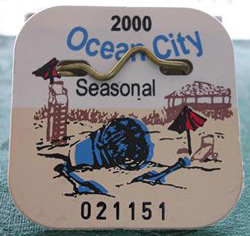What can we dig up about ocean beach Beach Badges in New Jersey?
Towns without Beach Fees
Lets start with the towns that have none. They are far and few in between so this is a relatively short list.
- North Wildwood
- Wildwood
- Wildwood Crest
- Upper Township in Cape May County
- Atlantic City
One of the things about these places not having a pay to play beach is they can brag about this fact. It is very unusual for a beach in New Jersey and Wildwood does in fact does play this up in their promotional ads.
Who started it?
I’m not sure. Seaside Heights and Lavallete had a beach badge system in place as early as the 1940’s. Surf City began their beach badge program in 1967 and Long Beach Township in 1976. You can read more (a lot more) about beach badges on Long Beach Island here http://lbibeachrentals.com/Beach%20Badges.html
 An interesting aspect of the passing of borough by borough beach badge ordinances is the regularity of the same kind of process unfolding in many different places. First the town officials come up with a plan to sell beach badges and this idea in turn has to be “sold” to the residents. Town managers clearly realize the added revenue from beach badges can be a big boon to the local budget. Residents on the other hand are reluctant to begin to pay for something that they had been getting for free. Once an ordinance is passed and begins to take effect there is a period where some people that use the beach are angry and, in some cases, take their case to court. The defendant argues for unencoumbered beach access and the cases are always decided in favor of the municipality.
An interesting aspect of the passing of borough by borough beach badge ordinances is the regularity of the same kind of process unfolding in many different places. First the town officials come up with a plan to sell beach badges and this idea in turn has to be “sold” to the residents. Town managers clearly realize the added revenue from beach badges can be a big boon to the local budget. Residents on the other hand are reluctant to begin to pay for something that they had been getting for free. Once an ordinance is passed and begins to take effect there is a period where some people that use the beach are angry and, in some cases, take their case to court. The defendant argues for unencoumbered beach access and the cases are always decided in favor of the municipality.
Is it Justified?
New Jersey law states there is a Public Trust Doctorine that the public has a right to swim in coastal waters and walk along the shoreline. In 1955 towns were given the right to charge for access to their beaches to help pay for beach related services. Both of these concepts had to be further defined and clarified in court cases that challenged how municipalities used the monies they raised through selling beach badges and how they went about allowing access to the beach.
Charging high prices for daily badges, increasing parking fees, removing beach facilities heavily used by day visitors and restricting the times when non-residents could buy badges were all used by some towns to limit who could or would visit their beach. Deal, for example, had part of its beach reserved for residents and beach badges were lower for residents than for nonresidents. Many of these issues were resolved through state court cases in the 1980’s.
Yet there are still some contemporary cases where these same issues have come up again. It seems with lax oversight and the passage of time a few communities had slowly been working at effectively limiting access again.
Proposed Change
Over the years there have been many attacks against and changes proposed for beach badge administration in New Jersey. A state law to abolish beach fees altogether has been floated as an idea on a number of occasions. There have also been a few times when it was felt a more expansive system would be better. Allowing badges to cover more than a single town beach would be nice for visitors but few towns are ever willing to give up their tight control over their own well developed beach badge systems.
Another interesting twist to allowing more beach access has come with the replenishment of beaches along some less publicly used beaches. It has been argued that the state and federal government paying to restore beaches means that the municipalities that benefit should provide some standard public access beach facilities: access from a public thoroughfare, reasonable parking arrangements for at least some visitors and restrooms. This forced some of the more exclusive New Jersey beach communities, that have historically had no real public use of their beaches, to open up their beaches to more people. Many of the same people that clamored for public help to save their beachfront homes, threatened by beach erosion, wanted nothing to do with the public once their beachfront was made wider and more secure.
Looking Back
Here is a 1996 look at some beach badge prices:
BAY HEAD $5 daily $55 season
BELMAR (1989 $8 daily!) $5 daily, a 50-cent increase over last year. $40 season
CAPE MAY $3 daily, $9 weekly, $15 season
DEAL $4 weekday, $5 daily weekend, $55 season
LAVALLETTE $4 daily $25 season
SPRING LAKE $5 daily, a 50-cent increase over last year (and also once had an $8 per day fee)